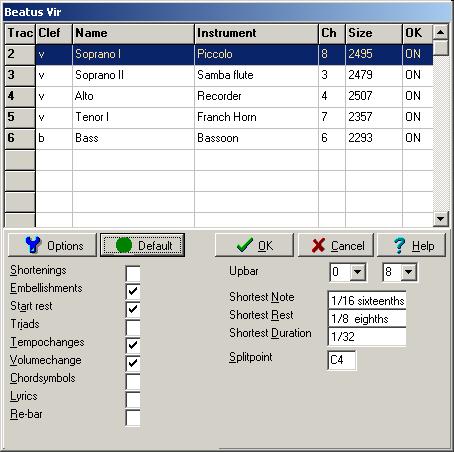Midi import
It is possible to import a MIDI-file in MusiCAD thereby converting it to an editable MusiCAD-file. However, conversion can be tricky sometimes. Especially live played performances are difficult to 'catch' using readable notation.
- [Shortenings]
- On translating midi-events to notes you may define that (very) short notes may be notated using staccato signs.
- [Embellishments]
- Embellishments like trill-signs may be used (or not) to when translating sequences of short notes.
- [Start rest]
- Start rest is often needed is multi-voice scores
- [TempoChanges]
- Inclusion of tempo-changes
- [VolumeChanges]
- Inclusion of volume-changes
- [ChordSymbols]
- Inclusion of chord symbols
- [Lyrics]
- Inclusion of lyrics.
- [Lyricfs]
- Sometimes barlines dividing long notes require a 're-bar' operation.
- [Upbar]
- use of pickup/upbar value sometimes helps transcribing a MIDI-file to notes
- [split-point]
- The split-point determines the lowest note that should be assigned to the treble-clef if a grand staff is chosen (select a P) for the clef.
Quantization parameters for [Shortest Note], [Shortest Rest] and [Shortest Duration] to qualify for a note determine the resulting score.
After import, MusiCAD will use the installed MIDI layout template as defined in [Options|Preferences|Files].

